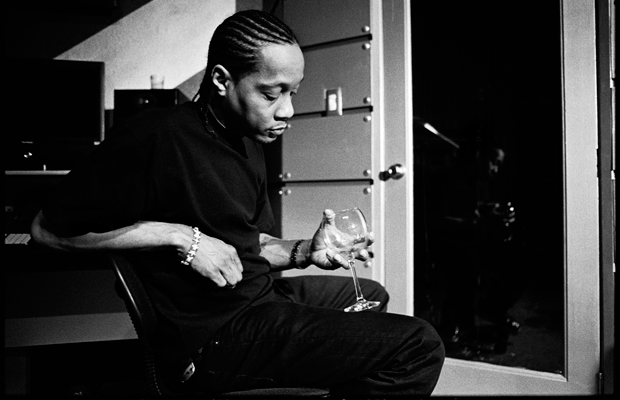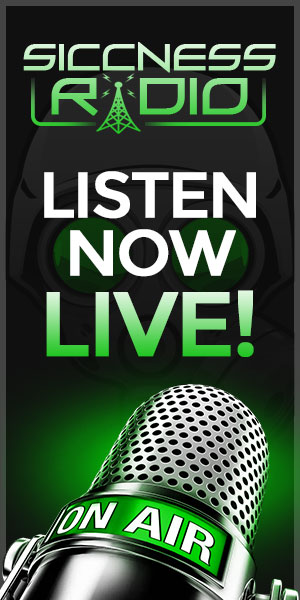L.A. hip-hop is strongly identified with gangsta rap, and that genre is mostly identified with its rappers and their outsized personas. But the cla##ic Los Angeles albums wouldn’t be what they are without the incredible sonic textures that define them, the funk, electro, rock, and Latin influences that give them their vitality, their urgency.
The West Coast sound is immediately identifiable, and it’s what makes our hip-hop simultaneously menacing and warm. Here, then, are the ten local producers who gave us tapes full of dope beats to bump when strolling through our hoods. -Ben Westhoff
1. Dj Quik
The obvious choice for LA’s best producer is Dr. Dre. But Andre Young belongs to the world. DJ Quik is the hero of only one region. The subversive genius of freeway funk was so gifted he could get away with simultaneously being in the inner sanctum of Eazy E and Suge Knight. His homemade ca##ette tapes sold from the CPT to Crescenta Valley well before Profile Records scooped him up. KDAY plays him so much you’d think that there was evidence of payola.
Within Quik’s production, you can feel the sober gravity of someone who knows where the bones are buried and the Sunday BBQ backyard culture of Southern California. There are eight solo albums–all good to great. There’s the entirety of Suga Free’s Street Gospel, the space funk odyssey of BlaKQout, and Raphael Saadiq’s best song (maybe). He briefly turned AMG, 2nd II None, and Hi-C into stars. He sold Shaq a hit in 1998 (“Strait Playin’) and 8Ball &MJG’s “Buck Bounce” should have sparked an entire sub-genre.
See also: DJ Quik: Trials and Tribulations of a West Coast Legend
Quik is savage, stoned, and sentimental, with both soulful Heavy D tributes and critically acclaimed concept records about hating his sisters. He is weird and restless, inventive, balanced. What he may lack in national influence, Quik has compensated for with consistency and longevity. L.A. rap is forged out of the funk. Dre slowed it down and went kaleidoscopic. He was political. Quik was all internal combustion and ferocious neuroses. There were gorgeous instrumental grooves and drums that have been engineered to make sounds that no one thought could be made.
Twenty years deep, the Compton live wire remains America’s most complete artist. There is no one right answer to who is the best. It’s more a question of what do you prefer: the good doctor or the mad scientist? The latter are more interesting and experimental and they always have better hair. -Jeff Weiss
2. Dr. Dre
Like many rap legends who came of age in the golden era, Dr. Dre’s legacy is preserved in amber; not because he died, but because he refuses to release new music. Which, let’s be honest, post-“I Need a Doctor” we’re all pretty much ok with. Because in the production work he’s given us, either his own or that of Eminem, NWA, Eazy-E, Mary J. Blige, Snoop, Tupac, 50 Cent, D.O.C., Eve, The Game, or others, there’s a comforting through line. It’s not just his Parliament/Funkadelic mining or his mesmerizing snyths. It’s an unmistakeable craftsmanship, opposition to gimmicks and commitment to timelessness. Like great renaissance sculptures or cla##ic literature, his music has universal appeal that doesn’t date itself. And unlike almost every other producer, he has an ear for what will last and what won’t. He seems to have decided that his newest work doesn’t pa## muster, and maybe we should be thanking him for that. -Ben Westhoff
3. The Alchemist
Alchemist’s gritty production is a world apart from his squeaky clean beginnings in Beverly Hills. With a career that has spanned from forming The Whooliganz with Scott Caan to being behind Jadakiss’ smash hit “We Gonna Make It,” he has earned acclaim working with West Coast vets including Snoop Dogg, Cypress Hill, Dilated Peoples and Ras Ka##. His extensive line of work has also included DJing for Eminem and his latest group Gangrene (with Madlib’s brother Oh No) that has blazed trails through the underground. -Jesse Fairfax
4. Madlib
Oxnard native Madlib releases a ma##ive variety of albums and DJ compilations from behind a wall of pseudonyms. Following his career is like tracking a comic book villain — you never know if Lord Quas, Beat Konducta, or someone else will show up. In any case, Madlib’s long-running relationship with Stones Throw Records places him firmly in the L.A. cannon; that label released 2004’s Madvillany, a collaboration with MF Doom that many consider one of the greatest underground hip-hop records ever. The rest of his excellent Stones Throw catalogue and Medicine Show series helped raise a legion of alternative hip-hop heads, including Flying Lotus. -Kai Flanders
5. DJ Muggs
Born in Queens, DJ Muggs found his success as a DJ after moving to Los Angeles. He broke mainstream after helping produce the song “Mad Mad World” by 7A3 for the Colors soundtrack in 1988. He soon partnered with B-Real and Sen Dog to form Cypress Hill, who released their self-titled debut in 1991 and masterpiece Black Sunday two years later. Muggs is arguably most famous for House of Pain’s smash “Jump Around,” but in any case his style — psychedelic, apocalyptic rock-infused joints — remains synonymous with West Coast rap. After a decade with Cypress Hill, and working with folks like Dr. Dre, Muggs founded the hip-hop collective Soul a##a##ins. He recently dropped a dubstep album to favorable reviews, called Ba## For Your Face. -Juan Gutierrez
6. Daz
Every time you sing “ain’t nothing but a gansta party” along with Snoop and Pac, you are experiencing the genius of a Daz Dillinger production. Snoop’s cousin from Long Beach created iconic Tupac joints on the rapper’s magnum opus All Eyez on Me, including “Ambitionz as a Ridah” and “I Ain’t Mad at Cha.” His fingerprints are also all over Doggystyle and The Chronic; if Dr. Dre is the architect of G-Funk, Daz heads up the scrappy construction crew. And though it’s often overlooked, Daz’s work with Kurupt as Tha Dogg Pound remains an underrated cornerstone of the [rip] Row catalog. -Kai Flanders
7. Battlecat
A mainstay of “most underrated producers of all time” lists, Long Beach producer Battlecat exploded nationwide in the mid-’90s on rapper Domino’s smash hits “Getto Jam” and “Sweet Potato Pie.” Along the way, he’s produced for every major west coast icon from Snoop Dogg to E-40 — not to mention Tom Jones. In the early 2000s, he was the go-to producer for new millennium g-funk, supplying The Eastsidaz with “G’d Up” and Mr. Short Khop with “Dollaz, Drank and Dank.” -Chaz Kangas
8. DJ Mustard
Only 22, DJ Mustard is rivaling — and, in many cases, surpa##ing — his idols with his signature ratchet sound. Though the style has featured in his local hits like YG’s “!!es Ain’t !!,” it’s also gone national on tracks like Tyga’s “Rack City,” 2Chainz’s “I’m Different,” and Young Jeezy’s “R.I.P.” He just dropped his debut mixtape Ketchup in June. But before you go complaining about this youngster on a list of O.G.s, know that his roots span to the last decade’s jerking movement, and that he’s helped make party rap (rather than the gangsta variety) the predominant West Coast sound. -Marcus Arman
9. Sir Jinx
Born Anthony Wheaton, Sir Jinx began his music career as a rapper in the short-lived group C.I.A. (Cru’ In Action!) alongside K-Dee and Ice Cube. Jinx’s cousin, Dr. Dre, produced their only record, an EP called My Posse. After N.W.A. split and Cube went solo, Jinx helped sculpt the Parliament-infused, concrete-jungle funk on some of Cube’s greatest records, including the famed N.W.A. diss “No Vaseline” from Cube’s cla##ic [rip] Certificate. Though he remains woefully underappreciated, Jinx has also produced tracks for Xzibit, WC, and Kool G Rap. -Max Bell
10. Egyptian Lover
The breakout star from the seminal mobile disco crew, Uncle Jamm’s Army, the Egyptian Lover didn’t invent electro-rap, but he built its pyramid of Khufu. The West Coast’s answer to Afrika Bambaataa, Greg Broussard defined afro-centricity, funk, and freaks for the pre-gangsta rap generation. The Egyptian Lover blended 808 slaps, Kraftwerk, and enough jheri curl juice and gold chains to pimp out and power a Delorean. His up-tempo sound lives on in everyone from Dam-Funk to the Black Eyed Peas. Even today, you can play “Egypt Egypt” and the walls will start to sweat. -Jeff Weiss
















Speak On It!